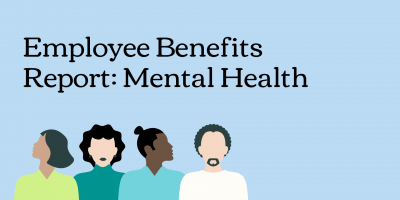
Employee Benefits Report: Mental Health
Amid rising chaos, nearly half of all Americans face mental health challenges—how are businesses stepping up to meet the growing demand for support?


Co-Founder of Suicide Watch and Wellness Foundation

MD, Board Certified Psychiatrist, Chief Medical Officer at PsychPlus

LCPC, EMDR Trauma Therapist at Mindset Quality
Only 15% of Gen Z aged 18-26 have “excellent” mental well-being, a stark contrast to previous generations at the same age.
The latest Voices of Gen Z report by Gallup and the Walton Family Foundation shows a significant decline in well-being over the past two decades, supporting the notion of an ongoing Gen Z mental health crisis.
For comparison, in 2004, 55% of young adults had excellent mental health, while the number fell to 52% in 2013.
The report further reveals that Generation Z also feels stress, sadness, anxiety, and loneliness on a daily basis. They experience negative emotions at least seven percentage points higher than Millennials, Generation X, Boomers, and the Silent Generation.
To what do we owe the growing Gen Z mental health crisis that inevitably spills into the workplace?
But more importantly, how can employers help reduce its effects?
Dubbed the “loneliest generation,” Gen Z is at the forefront of a public health emergency that has been in the making for years.
According to the Centers for Disease Control and Prevention (CDC), between 2000 and 2016, suicide in the U.S. increased by 30% across all age groups.
Investigating further into this, a publication on Jama Network reveals that suicide rates among adolescents and young adults reached a peak in 2017, with males being more affected than females.
Racial and ethnic disparities are also pervasive, as minority youth are less knowledgeable and positive about mental illnesses and are less likely to receive mental health care.
More recent data shows that the percentage of young people who experienced a major depressive episode doubled over a decade, and according to the Pew Research Center, 70% of teens across all genders, races, and economic backgrounds saw depression and anxiety as significant issues.
Post-pandemic, youth mental health further declined.
The Cigna Loneliness Index reveals that eight in ten workers aged 18-22 feel alone “sometimes” or “always,” a surge from 73% in 2020 and 69% in 2019.
In contrast, the loneliness percentage for seniors was 41%.
Moreover, twice as many Gen Zs and Millennials feel left out compared to older generations. Or, 42% of people aged 18-34 reported “always” feeling that way, against 16% of those aged 55 or older.
The data reveals troubling patterns among young adults.
It also underscores the urgent need for targeted support and intervention in addressing the substantial Gen Z mental health crisis.
However, before we delve into the role of employers in this, let’s explore the root causes of the crisis.
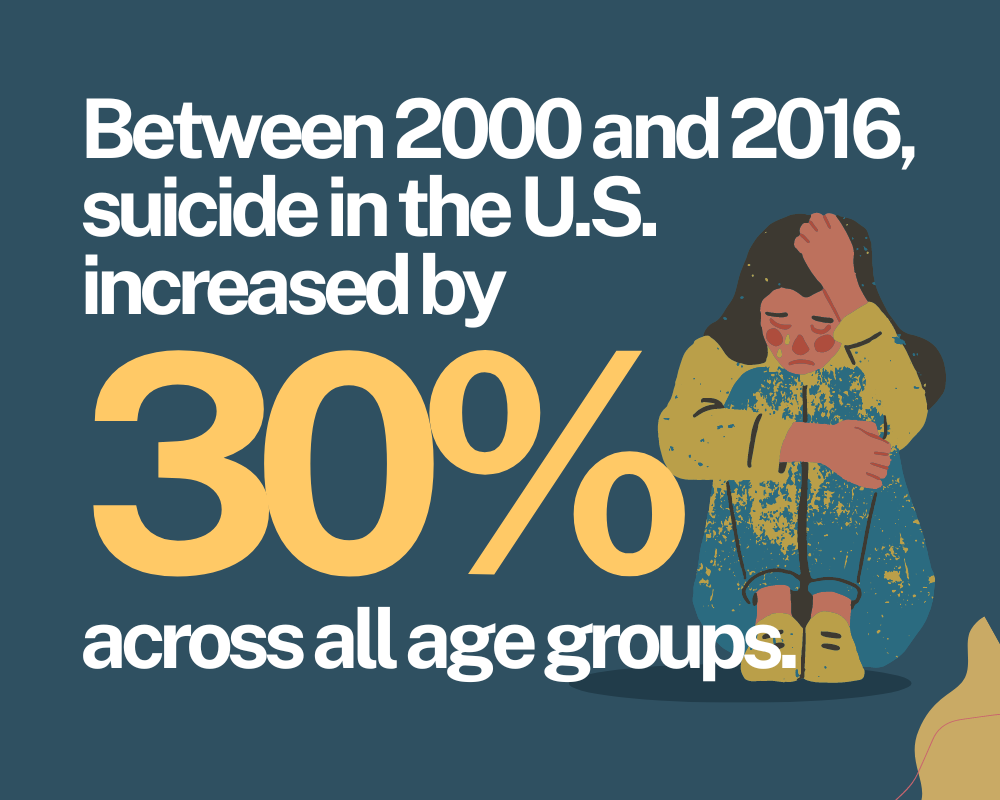
Born and raised during the rise of the internet, smartphones, and social media, Gen Z faces many unique challenges. Despite the advantages of being tech-savvy and skilled, this generation feels the weight of digital transformation more than any other.
For example, Gen Zs were likelier to cite negative feelings about social media and poor mental health than other generations.
“We are in the middle of a national youth mental health crisis, and I am concerned that social media is an important driver of that crisis – one that we must urgently address,” explains U.S. Surgeon General Dr. Vivek Murth for the U.S Department of Health and Human Services.
He expresses concern over the effects of harmful content, bullying, and lack of in-person socializing, pointing at the growing evidence of this.
However, it’s not just social media.
The pandemic, the housing crisis, inflation, and the recession that followed were all factors contributing to the mental health crisis.
Other socioeconomic challenges also played their part.
If we look at current events, the American Psychological Association (APA) reports that while they are stressful for all Americans, the youth are feeling its impact the greatest.
For example, mass shootings affect 75% of Generation Z, and headline issues like immigration and sexual assault are significant stressors for this age group.
As they enter the workforce, financial stress emerges as another factor, as personal debt (33%) and housing instability (31%) become sources of anxiety for the youngest workers.
While this shift was deemed concerning by APA’s CEO Arthur Evans, he also pointed out that it might indicate a positive aspect.
Evans suggested that Gen Z might be more attuned to recognizing mental health issues than older generations, and he viewed their openness as an opportunity to initiate discussions about stress management.
Are these factors creating challenges for employers?
For some, the answer is certainly yes.
After all, statistics show that the economic impact of depression costs around $100 billion per year, including $44 billion in lost productivity.
However, the increased awareness and acceptance of mental health issues also represents an opportunity for organizations to resolve the “problems” with Gen Z in the workplace.
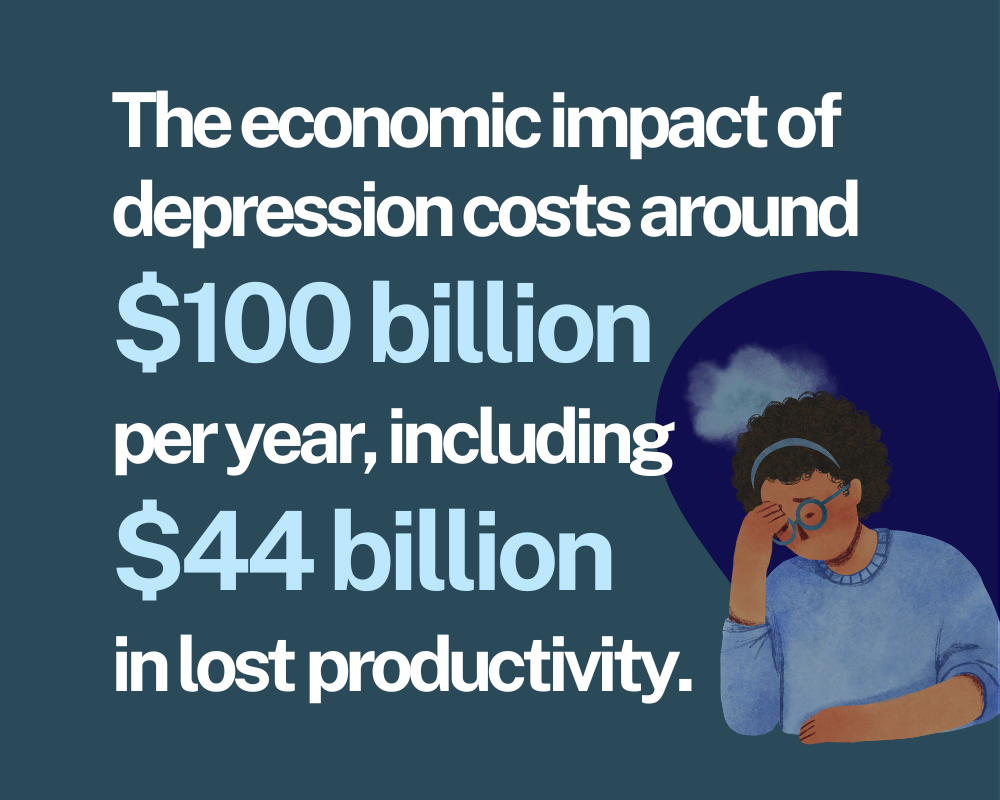
Three in four managers agree Gen Z employees are difficult to work with, criticizing their poor work ethic.
Emerging trends like quiet quitting, lazy girl jobs, or bare minimum Mondays also play a part in their poor reputation.
However, beyond this lies an overwhelming issue.
Could it be that Gen Z’s values and performance in the workplace are influenced by their declining mental health?
The Cigna report on loneliness parallels this topic with workplace disengagement, lower productivity, and poor health and performance.
Only 47% of lonely employees agreed they can work efficiently, and 48% said they perform to the best of their abilities, against 64% and 65%, respectively, for their non-lonely colleagues.
Moreover, around 30% didn’t feel well at work, compared to just 14% of non-lonely employees.
Another 27% were more likely to be dissatisfied with their jobs than 7% of employees who didn’t feel lonely.
Although a portion of the crisis, this shows how big of an issue loneliness can be and its effects on employers and employees.
If we weigh stress, anxiety, and depression, the problems with Gen Z in the workplace are further exacerbated, intensifying the need for employers to address mental health challenges.
Beyond an ethical obligation, this also emerges as a strategic business move, acknowledging the significant impact that employee well-being can have on organizational success.
As Gen Z enters the workforce, addressing their mental health becomes imperative for employers.
Thus, their role starts by understanding the factors, scope, and complexity of the issue.
Reflecting on the stress and antisocial behavior influenced by COVID-19 as one factor, Misha McK, co-founder of Suicide Watch and Wellness Foundation, explains what organizations should do to make sure their workforce is happy, productive, and efficient.
“We’ve become a little more antisocial.
We’re not used to seeing each other face-to-face. That’s where the stress level can come in – it’s almost reintroducing ourselves to dealing with one another on a personal level.
It’s extremely important for employers not to just care about their employees but to design programs that the employees can go to and get help without being judged when they do have these issues.
Once you feel that you have some emotional stressors, there should be a place where they can go and get help.“
Beyond destigmatization and creating a safe space for open communication, the role of employers transcends into support through different strategies, resources, and benefits.
“Supporting the mental health needs of Gen Z employees involves creating a positive work environment, promoting work-life balance, offering mental health resources, and fostering open communication,” recommends Dr. Cassandra Boduch, MD, Board Certified Psychiatrist, Chief Medical Officer at PsychPlus.
These can vary depending on the company and the needs of its employees.

Providing the right resources and benefits plays a major role in tackling the Gen Z mental health crisis in the workplace and beyond.
From comprehensive insurance to employee training, the following strategies tackle the importance of awareness and access to better mental health care.
Wellness programs play a crucial role in fostering mental health among all employees. They go beyond traditional health initiatives, emphasizing holistic well-being by incorporating mental, emotional, and social elements.
By investing in wellness programs tailored to the unique needs of Gen Z, employers contribute to their workforce’s overall mental well-being and create a positive and supportive workplace culture that aligns with the evolving expectations of today’s workforce.
More targeted solutions would be mental health benefits like insurance coverage for therapy sessions, psychiatric consultations, and medication expenses.
Subscriptions to health apps that offer self-care, meditation, and stress management tools are also suitable for tackling these challenges.
Employee Assistance Programs (EAPs) provide confidential mental health counseling and support services. According to Arielle Jordan, LCPC, EMDR Trauma Therapist at Mindset Quality, they are a “friendly helper.”
“Ensure employees know about your Employee Assistance Program – it’s like having a friendly helper on standby whenever they need support,” advises Jordan.
Dr. Cassandra Boduch also agrees with using EAPs as a benefit, adding that “implementing initiatives like Employee Assistance Programs and destigmatizing mental health discussions can contribute to a healthier workplace for this generation.“
Gen Z is perhaps more aware of the issue than other generations. However, conversations about mental well-being and the ongoing crisis should happen across all age groups in the workplace. Hence, one of the roles of employers is to increase this awareness and educate the workforce on this matter.
Training for managers, leadership, and workers can reduce stigma and increase understanding. Hosting these workshops and programs can also help in easier detection of signs leading to mental well-being issues among employees, including work anxiety and depression.
The right resources and benefits can go a long way in making the workplace less stressful for employees.
But, when Gallup asked Gen Z what they wanted, employee well-being was one of their answers.
They also expected their leaders to be ethical and support diverse and inclusive workplaces.
“Studies say diverse teams are more creative and engaging. Embrace diversity to create a friendly, welcoming environment,” says Arielle Jordan,calling this move a “diversity supercharge.”
Beyond a Gen Z-approved workplace culture, she further advises employers working with Gen Z to use the following proactive strategies:
Weighing in the changes prompted by the pandemic, an increase in remote work, and concerning levels of loneliness, Arielle Jordan also suggests creating a virtual work environment for Gen Z’s mental well-being, including:
Since it stems from a unique intersection of societal shifts, digital transformation, and current events, the Gen Z mental health crisis demands a proactive approach from employers.
However, before implementing any initiative, the most important thing is understanding and acknowledging employees’ unique needs.
Whether it’s an EAP, mental health days, or a comprehensive wellness program, what matters is doing it to create a positive work environment.
Thus, in addition to mental health initiatives, consider introducing flexible hours and remote work, as well as policies that support a culture of employee recognition, work-life balance, and overall well-being.
As employers navigate the Gen Z mental health crisis, there are valuable lessons to be learned.
With significant proof of heightened depression, anxiety, and stress among this generation, it becomes clear that failure to prevent or mitigate their effects will impact productivity and engagement in the long term.
Thus, employers should design functional strategies for a work environment approved by Gen Z. Open communication, diverse teams, comprehensive wellness benefits, and flexible work seem to be the best practices for now.
Ultimately, as Arielle Jordan concludes, “The goal is to create a workplace where Gen Z feels supported and valued. These strategies, backed by research, will boost their mental well-being and build a friendly, harmonious team.“
Disclosure: Some of the products featured in this blog post may come from our partners who compensate us. This might influence the selection of products we feature and their placement and presentation on the page. However, it does not impact our evaluations; our opinions are our own. The information provided in this post is for general informational purposes only.
Content Writer at Shortlister
Browse our curated list of vendors to find the best solution for your needs.
Subscribe to our newsletter for the latest trends, expert tips, and workplace insights!

Amid rising chaos, nearly half of all Americans face mental health challenges—how are businesses stepping up to meet the growing demand for support?
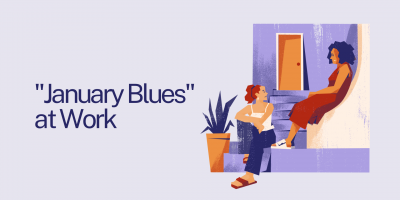
For some employees, it manifests as a seasonal dip in productivity and motivation. But for others, January Blues hints at more profound challenges within the workplace.
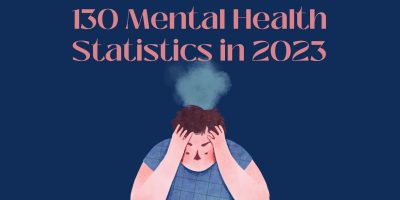
Uncover the pressing realities of mental health through insightful statistics, highlighting the urgent need for comprehensive support and awareness.
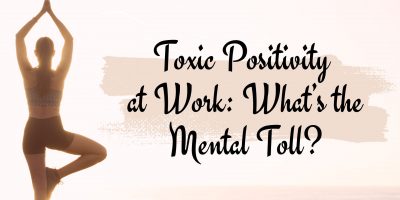
The critical part of addressing toxic positivity in the workplace is recognizing it exists. What signs should you look for, and how do you deal with toxic positivity at work before it becomes deeply rooted in your company culture?
Used by most of the top employee benefits consultants in the US, Shortlister is where you can find, research and select HR and benefits vendors for your clients.
Shortlister helps you reach your ideal prospects. Claim your free account to control your message and receive employer, consultant and health plan leads.